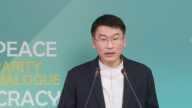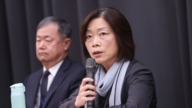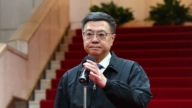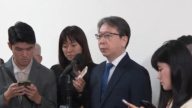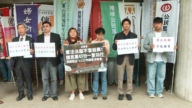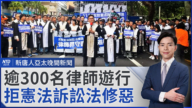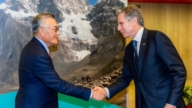【新唐人2014年12月05日讯】台湾执政的国民党在日前的“九合一”地方选举中惨败,有外媒指出,台湾这次选举其实是一次有关两岸关系的全民公投,人民利用选票惩罚了亲中共的国民党。
国民党在11月29号的选举中大崩盘,在22个县市长席位中,它只取得6席,连那些被它视为稳操胜券的城市,如新竹、桃园,也从它的手指尖溜走。国民党因此被不少台湾民众,包括媒体,戏称为“从台湾头输到台湾尾”。
国民党为什么落到这种田地呢?美国CNN报导说,失败有各种各样的理由。在许多选区,国民党情愿花更多时间攻击对手,而不是试图让选民相信,它提名的候选人很优秀。更重要的是,马英九和他的政党由于亲共,变得高度不受欢迎。
时事评论员蓝述:“对共产党的唾弃,不仅仅是台湾,它是一个历史的潮流,前苏联还有前东欧社会主义国家政权都已经倒台了。这一次台湾反映出来的,实际上是在这个大的历史背景之下,集中体现在台湾这么一个区域性的现象,主要是民众对国民党与共产党之间走的太近表示不满,表现了台湾的民众对中共的不信任。”
CNN的报导指出,马英九执政期间,试图透过与中共签署两岸协议,来重振台湾经济,以实现他的竞选诺言,但是,这个诺言从来没有实现。因为,跟中共增加贸易的好处,往往掉进大亨的口袋,而对于大多数台湾人,特别是年轻人,他们的前景依然黯淡无光。
报导还说,3月份爆发的“太阳花运动”提升了人们对“中共黑手”的认知。台湾人越来越意识到马政府这样做的政治风险,许多人指责马英九不够重视保卫台湾的主权和民主。因此,公民社会和许多被它激励的人,在这次选举中,惩罚了国民党。
蓝述:“中共过去一直通过向台湾让利这种办法,收买台湾政坛的一部分政客,主要是收买国民党这些官员,这么几十年走下来,台湾社会已经逐渐认识到,来自于北京的让利,实际上最后的结果是威胁到台湾社会的未来。特别这一次香港的占中运动的发展,让台湾民众彻底觉醒,所以这一次向国民党发出一个非常清晰的信号,如果继续采取与中共妥协的政策,国民党将很难再翻身。”
《中央社》引述法国《费加罗报》(Le Figaro)也指出,台湾民众用选票惩罚国民党的亲中政策。报导说,中国大陆是台湾的第一大贸易伙伴,但从来没有放弃以武力统一台湾,让珍惜民主的台湾人担心,与中国大陆的协商,会导致台湾被并吞。
《法国世界报》则援引一位法国学者的话说,马英九体制绕过民主机制,和中共达成协议,而且让警察和司法为政治服务,这些都在这次选举中受到了惩罚。
《纽约时报》指出,国民党在2016年的总统大选中,将很难保住执政地位。报导说,选民的态度,体现了对政府与北京关系过于密切的一个反弹。
台湾中央研究院的中国政治研究员徐斯俭向《纽约时报》表示,这是选民向国民党发出的一个强烈信号,也是对北京的信号,尤其在香港占中运动之后,台湾选民变得更加警觉。
中国反政治迫害同盟主席刘因全:“这样(亲中)的结果必然是把台湾拱手送给共产党,就是所谓的一国两制。 一国两制是个骗局,特别是香港,现在香港人看透了,就搞占中。台湾人民觉醒了,他们看到了危险,所以他们用选票唾弃国民党。国民党这一次是惨败,而且这一败不可收拾,我预言,国民党执政已经一去不复返了。”
英国广播公司《BBC》报导说,台湾这次选举被普遍看作是一次就两岸关系问题举行的全民公投。一些选民担心,如果继续允许执政的国民党与中共建立强而有力的联系,台湾将在经济上过于依赖中国大陆,从而有朝一日无力抵抗中共施加的统一压力。
采访/朱智善 编辑/陈洁 后制/萧宇
Foreign Media: Taiwanese Punish Pro-Communist Party
The recent fiasco during elections of Taiwan’s governing
party Kuomintang (KMT), drew wide speculation
from international media.
Some believed the 2014 local elections were widely seen as a
referendum on relations with China.
People punished the KMT which has been pro-Communist
in recent years with their votes.
During the elections on Nov.29, KMT crashed pitifully.
Among 22 constituencies in the mayoral and commissioner
elections, KMT had won only six of them.
Even cities such as Hsinchu and Taoyuan considered secure,
slipped through their fingers.
The Taiwanese dubbed KMT as being totally defeated
from the north to the south.
A special report of CNN indicated, there are sundry reasons
for the defeat.
In many constituencies, the KMT spent more time attacking
its opponents than trying to convince voters of the virtues
of its own candidates.
More importantly, Ma and his party have become highly
unpopular, after six years of rapprochement with Beijing.
Commentator Lan Su: “It is not just in Taiwan, the disgust
against the Communist Party is a historical trend,
such as the demise of former Soviet Union and the former socialist
countries of Eastern Europe.
Taiwan has demonstrated a regional phenomenon
under this historical background.
People are displeased with the close ties of the KMT and CCP.
It shows the distrust of Taiwanese people towards the CCP."
CNN’s report also said, the signing of cross-strait agreements,
the promised “revival" of Taiwan’s stagnating economy never
materialized.
Because the benefits of increasing trade with China tended
to fall in the lap of magnates,
while for the majority of Taiwanese — especially youth –
the prospects for their future seemed grim.
The report also analyzed, the Sunflower Movement raised
awareness about the “black hand" of China.
Many faulted Ma Ying-jeou for not paying enough attention
to safeguarding the island’s sovereignty and democracy
in the process.
There is no doubt that civil society, and the many that
it inspired, punished the KMT in the elections.
Lan Su: “It has been common practice for CCP to deceive
some of Taiwans politicians through its claim
of profits transfer to Taiwan.
After decades of experience, Taiwanese society has gradually
realized Beijing’s profit transfer will only threaten
the future of Taiwan.
The Hong Kong Occupy Central Movement has particularly
awoken the people of Taiwan.
This time, it is a very clear signal to the KMT, any further
compromising of policy with the CCP, will leave KMT
no chance of combat."
The Spanish newspaper ‘El País’ also reported that Taiwan voters
are punishing it’s government’s approach to China.
Being number one trade in Taiwan, Beijing has never
renounced the possible use of force to reunify Taiwan.
The setback of the close ties with China is the fear
of excessive reliance to China and the annexation of Taiwan.
The French Daily El Monde then quoted a French researcher ,
stating that Ma Ying-jeou’s KMT has claimed a monopoly
of relations between the two sides,
free of any consultation with civil society and other parties,
and systematically turning to the courts, the police force
are in service of its political agenda.
Thus the punishment is due in the elections.
New York Times pointed out, the election results…signal
that KMT will be hard-pressed to retain the presidency
in the 2016 election.
The Kuomintang’s losses also suggest that Taiwan voters may
be turning against party efforts to forge closer ties with China.
Hsu Szu-chien, a scholar of Chinese politics at Academia Sinica,
a state-financed research institution in Taipei told N.Y. Times,
the result is a very strong signal not only to the KMT,
but a signal to Beijing, too.
He said, “Particularly after the Occupy Central movement,
I think the Taiwanese voters are alarmed by the relationship
between Beijing and Hong Kong.”
Anti-Political-Persecution Alliance of China Chairman
Liu Yinquan: “The result (pro-Beijing) will surely lead to giving
up Taiwan to CCP, the so-called one country, two systems.
The “one-country, two systems” is a hoax.
Hong Kong, in particular, has seen it clearly.
That’s why there is the Occupy Central.
Taiwanese people are awakened to it. They saw the danger.
They show their disgust in the KMT with their votes.
The KMT has totally failed this time.
I think the KMT’s ruling is gone.
BBC reported that the Taiwanese polls were widely seen
as a referendum on relations with China.
There are worries that closer ties with China will ultimately
hurt Taiwan’s independence –
by making the island too economically dependent on its neighbour
and vulnerable to pressures to reunify.
Interview/Zhu Zisan Edit/Chen Jie Post-Production/Xiao Yu


